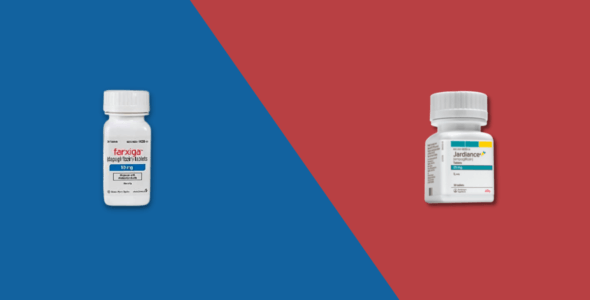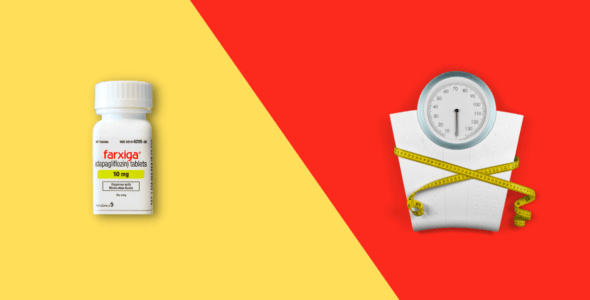Farxiga is a diabetes drug used for the treatment of high blood sugar levels in people with type 2 diabetes. It is also used in diabetes patients to reduce the risk of heart failure. Entresto is also used to treat heart failure.
Heart failure, also called congestive heart failure or cardiac failure, is when your heart still beats but can’t pump enough blood around your body. This can reduce how much oxygen your organs receive, which can make it harder for them to function and can cause damage.
Here we will explain how they work, their similarities and differences, their side effects, and more. This should provide you with the basics to better understand your options.
What is Farxiga?
Farxiga is an FDA (U.S. Food and Drug Administration) approved medication manufactured by AstraZeneca. It is classed as a sodium-glucose cotransporter 2 (SGLT2) inhibitor.
Farxiga is used alongside exercise and changes in diet to manage blood sugar. It helps to remove excess blood sugar through urine. The active ingredient in Farxiga is called dapagliflozin. When absorbed into your bloodstream, dapagliflozin slows down the rate at which your kidneys absorb sugar from your blood causing your kidneys to release sugar into your urine. Your blood sugar levels then fall as you urinate.
Farxiga also has FDA approval for heart failure patients with reduced ejection fraction (HFREF) to reduce the risk of cardiovascular death (CV death) and hospitalization. This was based on data from the phase 3 Dapa-HF trial.
Jardiance (empagliflozin), manufactured by Boehringer Ingelheim and Eli Lilly, also approved for type 2 diabetes now has two FDA approval for the treatment of heart failure.
Farxiga dosage
AstraZeneca’s Farxiga is available in tablet form, in the following doses: 5 mg and 10 mg.
To reduce the risk of hospitalization for heart failure in adults with type 2 diabetes mellitus and established cardiovascular disease or multiple cardiovascular risk factors, the recommended dose is 10 mg once daily.
For Type 2 Diabetes mellitus the recommended starting dose is 5 mg once daily, in the morning. Increase the dose to 10 mg once daily in patients tolerating 5 mg who require additional control.
What is Entresto?
Entresto (sacubitril/valsartan) is an FDA (U.S. Food and Drug Administration) approved medication manufactured by Novartis. Entresto is a relatively new drug used to treat heart failure. It’s prescribed to:
- Reduce the risk of hospitalization and death in adults with chronic (long-lasting) heart failure
- Treat heart failure in children one year and older
Entresto helps to lower your blood pressure, making it easier to pump blood around your body. The medication is usually prescribed instead of other angiotensin medications, like angiotensin-converting enzyme (ACE) inhibitors or other angiotensin II receptor blockers (ARBs).
Entresto has two active ingredients that work in combination, called sacubitril and valsartan. They help to lower your blood pressure to make it easier for your heart to pump blood around your body.
Entresto dosage
Novartis’ Entresto is available as a film-coated tablet, in the following doses: 24/26 mg, 49/51 mg, and 97/103 mg.
Your dosage for Entresto will be based on your condition, age, weight, and any other medication you may be taking.
Common side effects of Farxiga and Entresto
The most common side effects of Farxiga in clinical trials compared to placebo include:
- Dehydration
- Changes in urination
- Dizziness
- Back pain
- Yeast infection of the vagina or penis
- Weight loss
More serious side effects of Farxiga include:
- Low blood sugar (hypoglycemia)
- More serious urinary tract infections
- Inflammation of the pancreas
- Diabetic ketoacidosis
- Necrotizing fasciitis
The most common side effects of Entresto in clinical trials include:
- Dizziness
- A cough
- Headaches
- Tiredness and weakness
- Fainting
- Diarrhea
- Feeling sick (nausea)
- Stomach pain (gastritis)
More serious side effects of Entresto include
- Harm or death to your unborn baby
- Severe allergic reactions to the medication that cause problems with breathing and death
- Kidney problems, including reduced kidney function and kidney failure
- Low blood pressure (hypotension), particularly if you also take diuretic medications
- Increased levels of potassium in your blood
These aren’t all the side effects Farxiga or Entresto can cause. You can find more details in the patient leaflet that comes with your medication. If you have any concerns about side effects, talk to your physician or pharmacist.
Farxiga and Entresto drug interactions
Farxiga can interact with other medications. These include:
- Any other diabetes medications, like insulin or sulfonylureas
- Diuretics
- Corticosteroids
- Estrogens
- Oral contraceptives
- Nicotinic acid
- Calcium channel blocking drugs
- Rifampin
Entresto can interact with other medications. These include:
- Angiotensin-converting enzyme inhibitors (ACE inhibitors) – enalapril
- Angiotensin receptor blockers (ARBs)
- Any other medications taken to treat heart failure
- Any other medications taken to treat other heart conditions such as beta blockers
- Any medications that lower your blood pressure
- Potassium supplements, salt substitutes containing potassium, potassium-sparing medicines, or heparin
- Any medications taken to treat diabetes, particularly ones that contain aliskiren
- Any pain killers, particularly nonsteroidal anti-inflammatory drugs (NSAIDs) like ibuprofen or naproxen
- Diuretics
- Antibiotics
- Sildenafil (Viagra), used to treat erectile dysfunction or lung hypertension
- Lithium, taken to treat some psychiatric disorders
Farxiga and Entresto can interact with other medications. This can change how Farxiga and Entresto and other medications work and can make side effects more likely. Tell your prescribing physician about all your drugs, including vitamins and dietary supplements.
Farxiga and Entresto contraindications
You should not use Farxiga if you:
- Are allergic to the active ingredient dapagliflozin
- Are allergic to any of the other ingredients found in Farxiga
- Have diabetic ketoacidosis or a history of diabetic ketoacidosis
- Have severe kidney problems or are on dialysis
- Are under 18 years of age
- Are pregnant or are planning to become pregnant
- Are breastfeeding or are planning to breastfeed
Talk to your doctor before using Farxiga if you:
- Have Type 1 diabetes
- Have renal or hepatic problems
- Have heart disease
- Have an intolerance to any sugars
- Are over 65 years of age
- Are taking medication to lower your blood pressure or have a history of low blood pressure
- Often get urinary tract infections
- Are going to have surgery
You should not use Entresto if you:
- Are allergic to the active ingredients sacubitril or valsartan
- Are allergic to any of the other ingredients in Entresto
- Have ever had an allergic reaction to an angiotensin-converting enzyme (ACE) inhibitor or an angiotensin II receptor blocker (ARB) medication
- Are pregnant or are planning to become pregnant
Talk to your doctor before using Entresto if you:
- Have any kidney problems
- Have any liver problems
- Have a history of hereditary angioedema
- Are breastfeeding or are planning to breastfeed
If you have any concerns about Farxiga or Entresto side effects, talk to your physician, or pharmacist for medical advice. Also inform your healthcare provider about any medical conditions, supplements, and over-the-counter meds you are taking. You are also encouraged to report side effects to the FDA: visit http://www.fda.gov/medwatch or call 1-800-FDA-1088.






